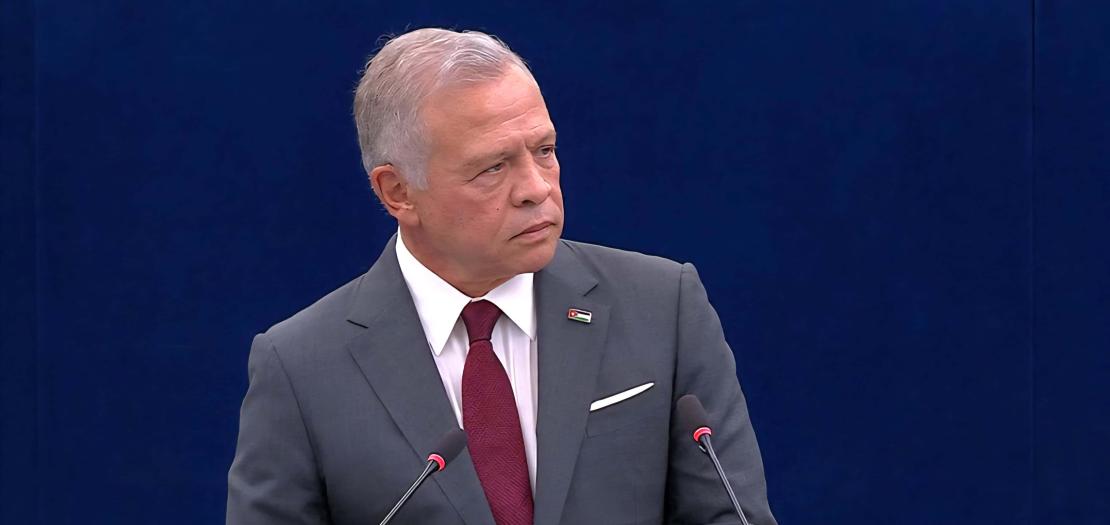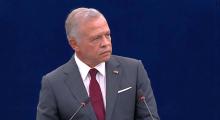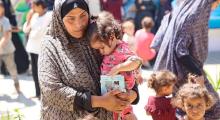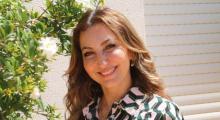Issued by the Catholic Center for Studies and Media - Jordan. Editor-in-chief Fr. Rif'at Bader - موقع أبونا abouna.org

His Majesty King Abdullah II delivered an address at the European Parliament’s headquarters in Strasbourg, France on Tuesday, June 17, 2025.
In the address, His Majesty noted that with Israel expanding its offensive to include Iran, it is now impossible to know where the boundaries of this battle will end, threatening people everywhere.
The King said that what is happening in Gaza is contrary to international law, moral standards and shared values, especially as violations continue in the West Bank, and the situation is worsening by the day.
His Majesty noted that Palestinians deserve the rights to freedom and sovereignty, and to establish their own independent state.
The King said the world is experiencing wave after wave of turmoil, becoming "untethered like it has lost its moral gravity", noting that these junctures of history are critical moments that require the world to cling to its values and not abandon them.
His Majesty added that true security lies not in the power of armies, but in the power of shared values, and peace imposed by force or fear will never last.
The King touched on the founding of the European Union, when Europe’s choices helped shape a more stable, principled world, highlighting that Jordan’s firm belief in the shared values of the three monotheistic religions is rooted in its history and heritage, which drives the Kingdom’s national principles of tolerance and mutual respect.
His Majesty added that these values are at the heart of the Hashemite Custodianship of Muslim and Christian holy sites in Jerusalem, whose historical and multi-religious identity Jordan has vowed to protect from any attack.
Following is the full text of the King’s speech:
"In the name of God, the Compassionate, the Merciful
Madam President,
Honorable Members,
Your Excellencies,
Thank you all, and it is an honor, as always, to be here to address the European Parliament.
My friends:
Five years ago, I stood at this podium and spoke of the urgent need to find political solutions to conflicts, to restore confidence in global justice, and help people, especially young people, find hope and opportunity.
Since then, multiple political, technological, and economic upheavals have tested our international community. A global pandemic, new security threats, unprecedented technological acceleration, rampant, hyper-charged misinformation, and a raging war in Ukraine, and a cruel one on Gaza, and now, the attacks on Iran, which threaten a dangerous escalation of tensions, in my region and beyond.
We are living through wave after wave of disruption, without pause.
It is no wonder our world feels untethered like it has lost its moral gravity. Rules are unraveling; truth shifts by the hour, hatred and division thrive, and moderation and universal values are losing ground to ideological extremes.
In the chaos, we risk forgetting who we are, and what we stand for. But it is precisely at these junctures of history that we must recommit to our values.
Because when the world loses its moral bearings, we lose our shared sense of right and wrong of what is just, and what is cruel. And when that happens, conflict is never far behind.
History teaches us that wars are rarely just about territory. They are battles over worldviews over which ideas and ideals will shape our future. And Europe understands that.
After World War II, it made a choice: to rebuild not just its cities, but its founding pillars. The people of Europe were determined to leave the past in the past, and build a new era of peace. They chose human dignity over domination, values over vengeance, law over might, cooperation over conflict.
In the wake of war, Europe realized that real security does not lie in the strength of armies, but in the strength of shared values, and that peace imposed by force or fear would never last.
Equally, you chose to recognize that what you had in common was far greater than what set you apart.
Today, so must our global community.
We know that disputes and differences are a human reality that the challenges we face will only get more complex, and that disruptions are the hallmark of our age.
But it's how we handle them, and the values we anchor ourselves to that count.
Throughout Arab and European history, respect, responsibility, goodwill, and good faith have guided collaborations that led to our mutual good. And they can guide our response to today's challenges as well.
Speaking from this podium, and many others in the last two decades, I have sought to shed light on the values we share many rooted in our different faiths, Islam, Christianity, Judaism.
The values of compassion, justice, and equality. The moral teachings passed to us over generations that call on us to love our neighbors, to protect children and the innocent, to aid the poor and injured, to care for God's earth, and more.
In Jordan, our firm belief in these common values, grounded in our history and heritage, drives our national principles of tolerance and mutual respect.
And we are proud to be home to the Baptism Site of Jesus Christ, peace be upon him, at Bethany Beyond the Jordan.
Our Muslim country is home to a historic Christian community, and all our citizens share in building our nation.
The same call to goodwill lies behind the Hashemite Custodianship of Muslim and Christian Holy Sites in Jerusalem, whose historical and multi-religious identity we have vowed to protect from attack.
Indeed, our commitment echoes a promise to the people of Jerusalem made many centuries ago the Pact of Omar ordered Muslims to respect and protect the city's churches and not to harm a priest, nor kill a child, woman, or elder.
And a thousand years later, the Geneva Conventions made these tenets universal.
Recent events have called them into question. But we must ensure that these values and principles stand the test of time and turmoil.
My friends,
When I was last in this hall, I shared my conviction that: "There is always a better version of us around every corner."
Eighty years ago, you turned that corner, you chose a better Europe, and, for the longest time, the choices you made helped shape a more stable, principled world.
Today, that world is in moral decline. A shameful version of our humanity is unfolding before our eyes in real time, and our global values are unravelling at a shocking pace, with devastating consequences.
Nowhere is that clearer than in Gaza, a place where the world has stood at countless corners, each an opportunity to become something better, and time after time, it failed to do so.
Think back to 2023 the first Israeli attacks and raids on a hospital in Gaza sparked global shock and outrage. Since then, the World Health Organization has documented nearly 700 attacks on Gaza’s healthcare facilities.
How is it that what was considered an atrocity just 20 months ago, is now so commonplace it barely registers?
What version of our humanity allows the unthinkable to become routine? Permits weaponizing famine against children? Normalizes the targeting of health workers, journalists, and civilians seeking refuge in camps?
Twenty months. That should alarm us all. But not surprise us. Because when our global community fails to bridge the gap between principle and action, when values are not practiced, they become performative, abstract, and expendable.
We are at another defining crossroad in our history, one that demands a choice power or principle, the rule of law or the rule of force, decline or renewal.
Because that is what’s at stake, for everyone.
This is not just about Gaza. And it is not just another political moment. It is a struggle over who we are as a global community, and who we will become.
This year is likely to be a time of pivotal decisions for our entire world. Europe's leadership will be vital in choosing the right course. And you can count on Jordan as your staunch partner.
There are two essential areas for action. First, is supporting development, because a thriving Middle East creates opportunities that benefit us all. But as we have seen time and again, that reality cuts both ways. When hope is diminished, the consequences ripple across borders.
Second, is strong, coordinated action to ensure global security.
Our mutual security won't be assured until our global community acts, not only to end the three-year war in Ukraine, but also the world's longest and most destructive flashpoint, the eight-decade-long Palestinian-Israeli conflict.
Because, my friends, Palestinians, like all people, deserve the rights to freedom, sovereignty, and, yes, statehood.
What is happening in Gaza today defies international law, moral standards, and our common values. And we are witnessing transgression after transgression in the West Bank, with the situation worsening by the day.
If our global community fails to act decisively, we become complicit in rewriting what it means to be human. Because if Israeli bulldozers continue to illegally demolish Palestinian homes, olive groves, and infrastructure, so too will they flatten the guardrails that define moral conduct. And now with Israel's expansion of its offensive to include Iran, there is no telling where the boundaries of this battleground will end. That, my friends, is a threat to people everywhere.
Ultimately, this conflict must end. And the only viable solution is one grounded in a just peace, international law, and mutual recognition.
My friends,
The path to our better selves cannot be paved by technological advancements, scientific breakthroughs, or political triumphs alone. It is forged by the choices we make, each day, as individuals and as leaders.
The path to peace has been walked before. It can be again, if we have the courage to choose it, and the will to walk it together.
Thank you."
The Jordanian delegation included Deputy Prime Minister and Foreign Minister Ayman Safadi, Director of the Office of His Majesty Alaa Batayneh, and Jordan’s Ambassador to Belgium and Head of Jordan’s Mission to the EU Yousef Bataineh.







